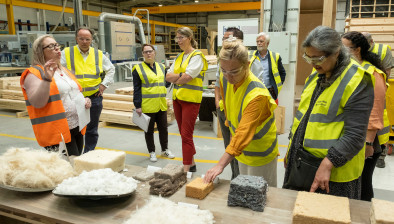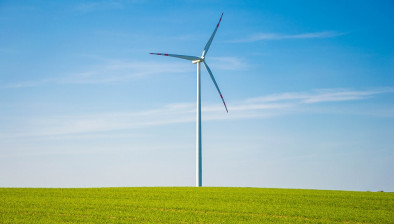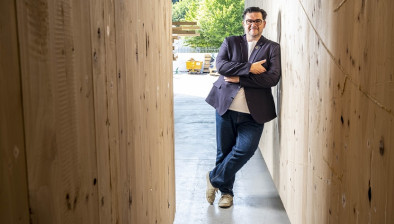Cost of decarbonising buildings ‘four times higher than Scottish Government estimate’

Stephen Good
The cost of decarbonising Scotland’s homes and buildings could be as much as £130 billion, four times more than the Scottish Government’s official estimate, Scotland’s Just Transition Commission (JTC) has warned.
A new report to be launched in Edinburgh this afternoon will set out what needs to happen if Scotland is to deliver the new investment required to decarbonise the economy in a fair way.
Stephen Good of the JTC said Scotland needed to “get real” about the costs involved. He also suggested the country was hugely behind on its ambition to decarbonise at least one million homes by 2030, and needed to be doing “about 30 times as much as we do at the moment”.
With major new announcements over recent weeks from Keir Starmer’s government regarding Great British Energy and the National Wealth Fund, the independent Commission says rigorous just transition investment planning by the Scottish Government will be vital: “A clear, high-quality prospectus for just transition investment has the potential to generate significant long term value for Scotland, including by making the most of opportunities to support the delivery of just transition outcomes presented by new initiatives at UK level, including the National Wealth Fund and Great British Energy.”
The report has five key messages:
- New and innovative investment models are needed.
- Finance for net zero is not the same as investment for a Just Transition.
- It’s time for strategic clarity on roles and responsibilities, including how key functions are to be split across public bodies, Scottish Government and local authorities.
- Action is required to join up and leverage local capacity
- The cost of failure is unacceptable, given the scale of opportunity for Scotland.
The JTC looked at four key sectors for new investment models: energy; transport; land use and agriculture; and the built environment and construction.
The report also surveys what it calls “building blocks”, initiatives that are already underway in Scotland which need to be further developed to ensure workers and communities are supported through the changes associated with emissions reductions. These include the Scottish National Investment Bank, work by local community groups to fund their own renewable energy projects and the Scottish Climate Intelligence Service, which will provide practical and technical support to 32 local authorities across the country in reducing our emissions.
Mr Good, a construction expert who addressed that element of the review, said: “The Scottish Government has estimated £33bn is needed to decarbonise Scotland’s homes and buildings. We have approximately 2.6m homes and 230k non-domestic buildings, so if you do the basic maths, that’s about £11.5k/ building.
“That might just about cover the installation cost of a heat pump in an easy-to-treat property. To meet the tougher end of the net zero objectives, we’ll need likely four times that investment, so circa £45k/building to do it once and do it properly, which is more like £130bn, not £33bn. So we need to get really serious about the costs of achieving net zero, who’s going to pay, and how.”
However, he said there were massive job opportunities.
Elsewhere, Mr Good said the ambition to decarbonise at least one million homes by 2030 was only six years away.
“We’re currently installing around 5,000 zero carbon heating systems per year – that’ s just heating systems and doesn’t include building fabric energy efficiency works,” he said. “That’s 19 per day or about 2.5 per hour. So we need to be doing about 30 times as much as we do at the moment.”
The JTC report also said the current approach to achieving net zero is not enough, with ministers told to “urgently” introduce a new model to achieve long-term economic value in the sector.
It said: “If investment provision is left to the market alone, we will see an unjust and ineffective transition.”
But it also warned ministers to factor in the “cost of failure” in areas like job losses and loss of ecosystem services if investment is not managed.
“Short-term ‘savings’ will be hugely costly to scotland if these ultimately stymie fair economic development at this critical juncture,” the report said.
Professor Dave Reay, co-chair of the JTC, said he hoped the new report would establish “a shared understanding of where we are on this national mission, and what now needs to happen if we are to finance a truly just transition to a low carbon economy”.
Co-chair Satwat Rehman said: “Our report leaves no room for doubt that if investment in Scotland’s journey to net zero is left to the market alone, we will see an unjust and ineffective transition.
“We need government at all levels to play a pro-active role in making sure the costs and benefits associated with these major, but foreseeable changes are shared equitably.
“This will involve new ways of working collaboratively and building up capacity where required to meet this challenge head-on, demonstrate responsible economic stewardship, and make the most of the tremendous opportunities net zero brings for economic and social renewal.”
The Scottish Government said it would carefully consider the report as it seeks to reach net zero emissions by 2045.
A Scottish Government spokesman said: “With emissions in Scotland already nearly cut in half, we are well positioned to continue leading on climate action that is fair, ambitious and capable of rising to the emergency before us.
“We are seeing sustained demand from households seeking to decarbonise heat in their homes. Last year the Home Energy Scotland Grant and Loan Scheme supported people to install more than 2000 heat pumps – a 17% increase compared to the same period the previous year – and more than 1,500 energy efficiency measures.”

















